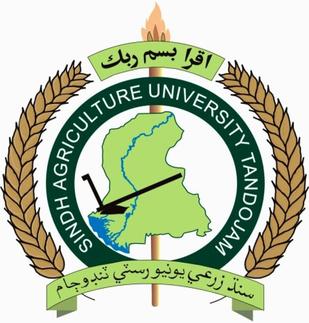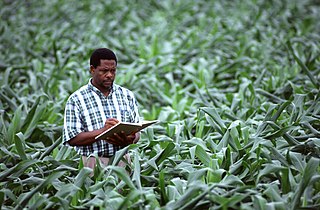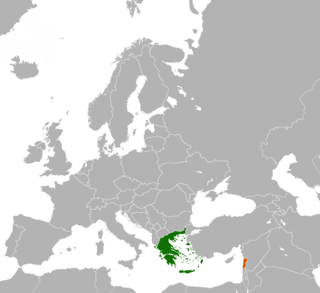
Agricultural science is a broad multidisciplinary field of biology that encompasses the parts of exact, natural, economic and social sciences that are used in the practice and understanding of agriculture. Professionals of the agricultural science are called agricultural scientists or agriculturists.

Chania, also sometimes romanized as Hania, is a city in Greece and the capital of the Chania regional unit. It lies along the north west coast of the island Crete, about 70 km (43 mi) west of Rethymno and 145 km (90 mi) west of Heraklion.

Agronomy is the science and technology of producing and using plants by agriculture for food, fuel, fiber, chemicals, recreation, or land conservation. Agronomy has come to include research of plant genetics, plant physiology, meteorology, and soil science. It is the application of a combination of sciences such as biology, chemistry, economics, ecology, earth science, and genetics. Professionals of agronomy are termed agronomists.

Çukurova University is a public university in Adana, Turkey. The university has sixteen faculties, three colleges, seven vocational colleges, three institutes and twenty-six research and application centers. The university campus is located 10 kilometres (6.2 mi) away from Adana city center, by the Seyhan Dam Lake.

The University of Agronomic Sciences and Veterinary Medicine of Bucharest is the oldest and largest institution of higher agricultural sciences and veterinary education in Romania. With around 12,000 students, the university offers 32 undergraduate programmes and 33 master programmes; all are available in Romanian, 6 in English, and 1 in French. Furthermore, there are also two doctoral schools specialised in five fields: Agronomy, Animal Science, Biotechnologies, Horticulture, and Veterinary Medicine.

Sindh Agriculture University, is situated in Tando Jam town of Hyderabad, on Hyderabad-Mirpurkhas highway and is about 200 km (120 mi) from Karachi airport linked with super highway to Hyderabad.

An agriculturist, agriculturalist, agrologist, or agronomist, is a professional in the science, practice, and management of agriculture and agribusiness. It is a regulated profession in Canada, India, the Philippines, the United States, and the European Union. Other names used to designate the profession include agricultural scientist, agricultural manager, agricultural planner, agriculture researcher, or agriculture policy maker.

Southwest University (SWU) is a public university in Beibei, Chongqing, China. It is affiliated with the Ministry of Education, and co-funded by the Ministry of Education, the Ministry of Agriculture and Rural Affairs, and the Chongqing Municipal People's Government. The university is part of Project 211 and the Double First-Class Construction.

The University of Zanjan (ZNU), Romanized as Dāneshgāh-e Zanjan, is located in Zanjan, Iran. It was founded in 1975 and organized into four faculties. Nowadays it is one of the largest universities in the country, with a community of over 10,000 students.

Bahauddin Zakariya University (BZU) (Urdu: جامعۂ بہاءالدین زکریا) is a public university with its main campus located in Multan, Pakistan. Bahauddin Zakariya University was founded in 1975 as Multan University, and is the 2nd largest university in Punjab. It was renamed in 1979 in honour of a Sufi saint Baha-ud-din Zakariya (1171-1262).

The University of Agricultural Sciences and Veterinary Medicine of Cluj-Napoca (USAMVCN) is a university in Cluj-Napoca, Romania. With around 6,000 students, the university offers 21 undergraduate programs; all are available in Romanian, 2 in French and 1 in English. Additionally, the university offers 23 Master programs.

Valenzano is a town and comune in the Metropolitan City of Bari, in Apulia, Italy. It is home to several centers of scientific research, including Tecnopolis, one of the biggest of the Southern Italy in addition to The Mediterranean Agronomic Institute of Bari (IAMB) part of the International Centre for Advanced Mediterranean Agronomic Studies (CIHEAM). Valenzano is the seat of the "Antonio de Viti de Marco" Technical, Economic and Technological Institute.

Greece–Lebanon relations are the foreign relations between Greece and Lebanon. The relation between both people dates back to early antiquity, with the early trading activities between the ancient Greeks and the Phoenicians. In modern times, Greek-Lebanese bilateral relations are very good at all levels. Greece has an embassy in Beirut and Lebanon has an embassy in Athens. Both countries are members of the Union for the Mediterranean and the Francophonie.
Institut Agro Montpellier is a French public institution devoted to higher education and research in Agriculture, Food and Environment. Montpellier SupAgro is widely open to international issues and partnerships, with specific focus and expertise on southern and Mediterranean areas. It trains students in most of the agronomy and life sciences fields. It is part of Agropolis Fondation. The Montpellier INRA research center is also located on la Gaillarde campus. It belongs to the Institut Agro, along with Institut Agro Rennes-Angers and Institut Agro Dijon.

Vietnam National University of Agriculture, until 2014 Hanoi University of Agriculture (HUA), is an education and research university specializing in the agricultural sector. The university is located in Trau Quy town, Gia Lam district, a Hanoi suburban area, about 12 km far from Hanoi city centre.

Zohara Yaniv – Bachrach is an ethnobotanist, researcher and lecturer in the field of medicinal plants.
The European Native Seeds Conservation Network (ENSCONET) is a conservation group for the preservation of wild species by maintaining a germplasm bank. It is made up of 24 institutions from 17 member states of the European Union, as well as five associate members. The network is coordinated by the "Millennium Seed Bank" of the Royal Botanic Gardens, Kew, United Kingdom and is founded under the auspices of the 6th "Research Framework Program" of the EU, and covers 5 of the 6 European biogeographic regions.












